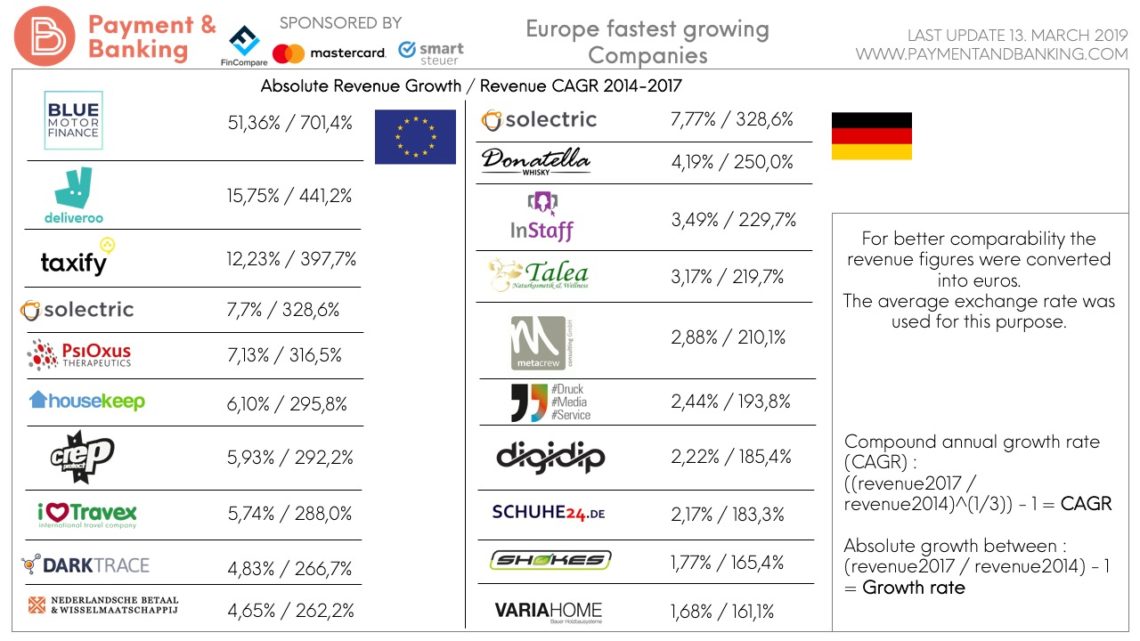Im Frühjahr letzten Jahres veröffentlichte die Wirtschaftszeitung Financial Times ihre alljährliche Liste der „1000 Europe’s Fastest Growing Companies“. Ein genauer Blick auf das 2019er-Ranking der am schnellsten wachsenden Unternehmen ermöglicht das Herauslesen von Zukunftsbranchen, die für Erfolg und Innovation stehen – und gerade den Start-ups und der Gründerszene gewaltige Chancen eröffnen.
Welche europäischen Wirtschaftsunternehmen wachsen am schnellsten? Diese Frage stellten sich die Financial Times (FT) und die Statistik-Datenbank Statista in diesem Jahr zum dritten Mal. Das Ergebnis: Das Ranking „1000 Europe’s Fastest Growing Companies 2019“[1], das eben genau jene Unternehmen aus 31 europäischen Staaten auflistet, die laut Financial Times außergewöhnliche Wachstumssteigerungen aufweisen. Dabei gab es einige Zulassungskriterien, um für die Liste berücksichtigt zu werden. So mussten die Firmen Mindestumsätze von 100.000 Euro für das Jahr 2014 und im Jahr 2017 mindestens anderthalb Millionen Euro Umsatz vorweisen. Weitere Voraussetzungen:
- unternehmerische Eigenständigkeit
- Hauptsitz in einem der 31 Staaten
- organische Umsatzsteigerung zwischen 2014 und 2017
Neben dem beachtlichen Wachstum haben die 1000 Unternehmen noch etwas gemeinsam: Sie sind innovations- und technologiestark. Beim genaueren Blick auf das Ranking zeigt sich, dass die gelisteten Firmen aus den unterschiedlichsten Sektoren stammen.
Von Lifestyle, LifeScience und Finanzen über Medien, digitale Dienstleistung und Gesundheit bis hin zu Technologie, E-Commerce und Online-Marketing. Die wachstumsstarken Player entstammen Branchen aller Couleur. Beachtlich: Unter den 1000 Unternehmen befinden sich zudem 233 Firmen aus Deutschland.

Verheißungsvolle Branchen
Den Spitzenplatz der Liste sicherte sich die britische Fintech-Gesellschaft Blue Motor Finance. Das Unternehmen, das app-basierte Fahrzeug-Kredite beim Autohändler vergibt, steigerte seinen Umsatz zwischen 2014 und 2017 um mehr als 50 000 Prozent. Platz Zwei sicherte sich der Online-Lieferdienst Deliveroo aus der „Food & Beverage“-Branche, ebenfalls aus Großbritannien. Mit einem Umsatzwachstum von 15 000 Prozent im genannten Zeitraum. Insgesamt drei Unternehmen aus diesem Sektor befinden sich unter den Top 15.

Das FT-Ranking bietet also nicht nur eine Übersicht über wirtschaftlich starke, in ihrem Marktsegment höchst erfolgreiche Unternehmen – sie zeigt auch, welche Wirtschaftszweige in Europa einträgliche Geschäfte versprechen. Branchen, die bereits verheißungsvoll sind oder dies mittel- und langfristig sein werden. Nicht zuletzt da es bei ihnen um Zukunftsthemen geht, die in den kommenden Jahren weiter an Bedeutung gewinnen werden. Etwa das Thema „Energie“.
Zukunftsbranche Energie
Viele Jahre war der Energiesektor vor allem den großen Unternehmen und Playern vorbehalten. Mit der (gesellschaftliche & politisch geforderten) Energiewende bekommen jedoch auch Start-ups und „grüne“ Gründer ihre Chance. Denn die Energiebranche der Zukunft muss weiter ausgestaltet werden und dafür braucht es Innovationen sowie kluge, digitale Geschäftsmodelle. Egal ob es um das Themenfeld der CO2-neutralen Produktion geht, um regenerative Energien oder alternative, umweltschonende und dabei effiziente Stromerzeugungsverfahren: Ist von zukunftsweisenden Branchen die Rede, fällt zwangsläufig der Begriff „Energie“. Zumal der Kreis der potenziellen „Abnehmer“ bzw. Kunden groß ist:
- Unternehmen
- Private Haushalte
- Städte/Kommunen
Sie alle wollen und brauchen intelligente Lösungen und Technologien zur – verlustarmen – Energieübertragung und -speicherung (Stichwort: Smart Energy).
Dass dieser Sektor für Firmen schon heute für enormes Wachstums-potenzial steht, zeigt ein Blick auf das FT-Ranking: Über 25 Unternehmen in der Liste gehören der Energiebranche an.
Mobilität im digitalen Zeitalter
Wie bewegen wir uns in Zukunft fort? Eine der drängendsten, spannendsten Fragen überhaupt, gerade im Hinblick auf die zunehmende Digitalsierung.

Denn diese wird unsere Mobilität künftig nachhaltig beeinflussen und in einem gewaltigen Ausmaß prägen. Verkehrs- sowie Technologieunternehmen und natürlich der Automobilsektor stehen vor der großen Herausforderung, immer mehr Menschen immer effizientere und vor allem klimafreundlichere Fortbewegungsmittel bereitstellen zu müssen.
Einerseits eine Herausforderung, andererseits aber erwächst hier auch enormes Potential für Neueinsteiger und junge Unternehmen, ihren speziellen Bereich zu finden und dort erfolgreich zu sein. Die Teilgebiete und möglichen Nischen sind vielfältig. Als besonders zukunftsträchtige Geschäftszweige sowie Dienstleistungen gelten unter anderem
- Mietmodelle
- Elektromobilität
- autonome Fortbewegung
- alternative Antriebsformen und Motortechniken
- rein app-basierte Geschäftsmodelle
Auch eines der Top-Unternehmen in der FT-Liste hat sich für ein solches Angebot entschieden: die estnische Transportnetzfirma Bolt (früher: Taxify). Das Unternehmen, mit dessen Transport- und Taxi-App man mobil Fahrten buchen kann, wies von 2014 bis 2017 ein mittleres Wachstum von knapp 400 Prozent auf.
Wie vielfältig und ausdifferenziert die Branche mittlerweile ist, zeigt ein Blick auf unseren Beitrag zum Thema „Mobilitäts-Start-ups“ vom Februar.
„Innovationstreiber“ KI
Ihr wird eine tragende Rolle im wirtschaftlichen Wettbewerb des 21. Jahrhunderts zugesprochen: der Künstlichen Intelligenz. Als Innovationstreiber werden hier nicht die großen Unternehmen angesehen sondern die Start-ups, die mit ihren wegweisenden technologischen Lösungen nahezu alle Bereiche unseres alltäglichen Lebens beeinflussen können. Weit mehr als es heute bereits der Fall ist.
„Start-ups gelten als große Innovationstreiber im Bereich KI.“
Denn in unseren Smartphones, in Bilderkennungssoftware, teilautonomen Fahrzeugen und intelligenten Sprach-erkennungssystemen kommt KI längst zum Einsatz. Immer geht es dabei um selbstständig arbeitende, erkennende oder analysierende Anwendungen und Systeme. Am Menschen orientierte, nachgehamte Intelligenz, für deren Entwicklung es fachliches Know-How und Spezialisten braucht: Eine große Chance für Neugründer.
Zu den Sparten und verwandten Gebieten mit Zukunftspotenzial und Aussicht auf Erfolg gehören unter anderem
- Robotik
- Mustererkennung
- wissensbasierte Systeme
- künstliches Leben
Der letztgenannte Punkt meint die Erforschung natürlicher Lebenssysteme mittels Computersimulation, die für die regenative Medizin (z.B. bei der Reproduktion abgestorbener Zellen oder funktionsgestörter Organe) künftig noch weit mehr Bedeutung einnehmen wird[2]. Schließlich leben wir heute im Schnitt so lange wie nie zuvor und die Lebenserwartung des Menschen steigt weiter unaufhörlich[3].
Healthcare-Start-ups
In direktem Zusammenhang mit gerade beschriebenem Thema steht ein weiterer Wirtschaftsbereich mit riesigen Wachstumschancen, in dem schon jetzt viele Firmen überall auf der Welt erfolgreich agieren: dem Gesundheitswesen. Dem „Health“-Sektor entstammen im FT-Ranking 24 Unternehmen. Sie stehen für ganz unterschiedliche Angebote, Verfahren und Produkte.

Attraktive Optionen erwachsen daraus in erster Linie wieder für Jung-Unternehmer mit zukunftsweisenden Ideen und Methoden. Denn in den kommenden Jahren wird der Einsatz von digitalen Technologien im Gesundheitswesen weiter steigen. Von modernen Diagnoseverfahren (z.B. Diagnose-Apps) und innovativer Medizintechnik über digitale Gesundheitsassistenten bis hin zu technologiebasierten Behandlungsmaßnahmen und verbesserten Ärzte-Patienten-Vermittlungsplattformen – der Digital-Health-Bereich dient vor allem einem Zweck: einer weiterentwickelten, qualitativ hochwertigen Gesundheitsvorsorge. Entwicklungen, von denen alle Beteiligten profitieren könnten. Die anwendenden Mediziner, der Patient sowie die Gesellschaft als Ganze.
Aussicht auf Erfolg haben Software-Angebote, Healthcare-Apps und E-Health-Lösungen, die alles aus einer Hand bieten. Zum Beispiel die Analyse und Dokumentation von Daten oder Untersuchungsergebnissen sowie die Optimierung, etwa von bestehenden Prozessen und althergebrachten, wenig effizienten Methoden. Auch für Fintech-Lösungen, die die Abrechnung der Ärzte mit den Kassen erleichtern, wird es in Zukunft einen riesigen Markt geben.
Quellen:
[1] https://www.ft.com/reports/europes-fastest-growing-companies
[2] https://www.aerzteblatt.de/nachrichten/sw/Regenerative%20Medizin
[3] https://www.zdf.de/nachrichten/heute/forscher-lebenserwartung-der-deutschen-steigt-weiter-100.html




